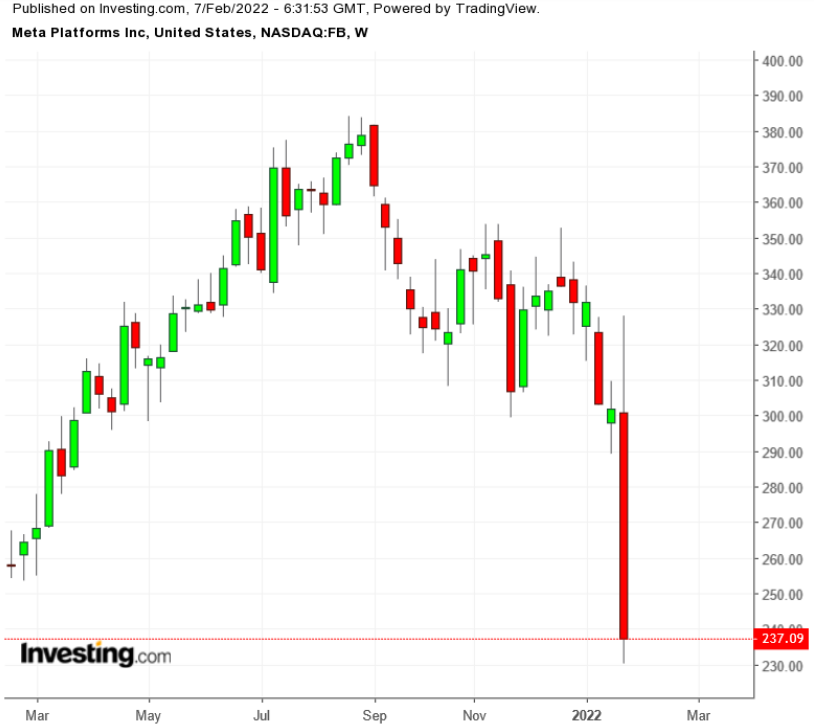Meta Platforms (NASDAQ:FB) is no longer a growth stock. That, at least, was the message investors received when the parent of Facebook, Instagram and WhatsApp released its latest quarterly earnings last week.

Investor reaction to the company's disappointing earnings report was quick and intense. The stock plunged 26% during Thursday's trading, wiping out about $251.3 billion of market value.
The pummeling was so intense it made history for the Facebook parent company and markets: the selloff was the worst one-day crash in equity market history and resulted in the biggest loss in market value for any US company ever.
There's some validity to the argument that the current volatile trading environment has played its role in this extreme move, but there was also strong evidence in the report showing Meta is struggling on a number of fronts and that the best days for its shares are over in the current cycle.
The stock closed on Friday at $237.09, down about 30% for the year. During the same period, the benchmark NASDAQ 100 Index fell 10%.
The most disappointing element of the Q4 release: for the first time, Facebook’s user base has stopped growing. It even shrank in some markets.
According to the Menlo Park, California-based Facebook, daily users fell to 1.929 billion in the fourth quarter from 1.93 billion. The news, combined with a forecast for lower than expected revenue growth in the current quarter, sapped investors’ confidence and sent the stock tumbling.
Meta said it expected revenue growth to slow because users were spending less time on its more lucrative services. It also blamed surging inflation which is crimping advertiser spending. With these headwinds, the company is unable to neutralize the impact of changes in Apple (NASDAQ:AAPL) privacy settings which give users the choice of stopping apps from tracking their internet activities, denting profitability for companies that sell targeted advertising, one of Meta's biggest revenue sources. These changes could cost Meta some $10 billion this year.
Intensifying Competition
As new users become a rare commodity in the post-pandemic environment, intensifying competition is another headache for Chief Executive Officer Mark Zuckerberg. He told investors in a conference call that the social networking giant faced an “unprecedented level of competition,” with the rise of TikTok, the rival viral-video platform.
Another big hurdle that could hurt FB's future earnings—the company’s shift to virtual-reality headsets, augmented-reality glasses and virtual worlds, known as the metaverse, in which users can live and work. Meta plans to invest heavily in this project whose success isn’t guaranteed. Meta’s Reality Labs, which is giving a shape to this undertaking, lost $10.2 billion in 2021.
This big adjustment suggests that Facebook’s latest growth phase is over and investors might have to wait for the stock to recover lost ground. Argus Research, while downgrading Facebook to hold from buy, said in a note:
“The 4Q results were modestly disappointing, though it was the company’s outlook that both upset the market and led to our downgrade. Although controversy has often swirled around Meta, the company faces a long list of problems in 2022, with increased competition and pressure from Apple’s new advertising tracking policy being the most salient.”
Though the current outlook clearly shows that the company, which has been the darling of growth investors, is running low on gas, we think Zuckerberg has the ability and financial muscle to reverse the course.
On Wednesday’s call with investors, Zuckerberg said Instagram’s Reels, a TikTok copycat, is its best chance to recruit more young people to the site. The company will be investing in growing it as quickly as possible. In addition, the company’s pivot to the metaverse is a long-term bet that could reward patient investors.
Plus, it’s not the first time Meta shares have seen a dramatic drop. The stock plunged 19% in July 2018 on a slowdown in user growth. At the time, it also set the record for the largest-ever loss of value in one day for a US-traded company. But over the following three years, the stock resumed its upward trajectory, almost doubling in value until last fall.
Bottom Line
The plunge in Meta shares indicates a massive adjustment in investor expectations. That downside move could still have more room to run.
But it’s important to remember that Zuckerberg’s company has been here before, and could reverse the course yet again.
Which stock to consider in your next trade?
AI computing powers are changing the Canadian stock market. Investing.com’s ProPicks AI are winning stock portfolios chosen by our advanced AI for Canada, the US, and other exciting markets around the globe. Our top strategy, Tech Titans, nearly doubled the S&P 500 in 2024 - one of the most bullish years in history. And Beat the TSX, designed for broad market exposure, is showing +878% gains with 10 years’ back-tested performance. Which Canadian stock will be the next to soar?
Unlock ProPicks AI